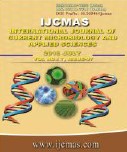


 National Academy of Agricultural Sciences (NAAS)
National Academy of Agricultural Sciences (NAAS)

|
PRINT ISSN : 2319-7692
Online ISSN : 2319-7706 Issues : 12 per year Publisher : Excellent Publishers Email : editorijcmas@gmail.com / submit@ijcmas.com Editor-in-chief: Dr.M.Prakash Index Copernicus ICV 2018: 95.39 NAAS RATING 2020: 5.38 |
Dengue Fever is a Flaviviral infection transmitted by the Aedes mosquitoes. It is a major public health issue in tropical and subtropical countries. Dengue virus is having four serotypes. It may progress to Dengue Hemorrhagic Fever, which can lead to Dengue Shock Syndrome and death. The study was conducted in the Department of Microbiology. K S. Hegde Medical Academy with the blood samples collected from the patients with clinical diagnoses of Dengue without any age or gender restriction. The samples were collected from the period of October 2015 to April 2017. Two blood samples were collected from each patient. First sample collected between 1-5 days of appearance of clinical symptoms and second sample between 15-21 days. 67 samples were collected and tested with Rapid test (Dengue Day 1Test) and ELISA test for the detection of NS1Ag, IgM and IgG antibody. Results from both methods were compared for evaluation considering Elisa as a gold standard. 67 samples from Dengue positive patients were collected in the time period of study and processed. In first sample, Rapid test showed 54 NSI Ag positive cases, 13 NS1Ag negative, 9 IgM positive, 10 IgG positive and 1 case positive for both IgM and IgG. In ELISA test, no positive cases for IgM and IgG together, but other reports were same. In second sample out of 67 samples 41 were positive for NS1Ag, 26 were negative. IgM positive in 27, IgG positive in 21 and both IgM and IgG positive in 9. In Elisa tests NS1Ag positive in 40 negative in 27. IgM positive in 31 and IgG positive in 25. Both IgM and IgG was positive in 17 cases. Statistical analysis and Evaluation of kits was done considering ELISA as gold standard comparing sensitivity, specificity, positive predictive value, negative predictive value and diagnostic accuracy. Dengue infection is a vector borne disease and it has to be diagnosed early so that control measures can be taken at the earliest to prevent epidemics. Accurate and early diagnoses will decrease the mortality by giving adequate medical care. In a developing country like India most of the hospitals are not well equipped and resource setups are not standardized. So the diagnostic strategy should be based on accuracy and cost effectiveness without causing heavy financial burden to the community and Government.
 |
 |
 |
 |
 |